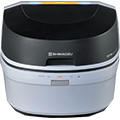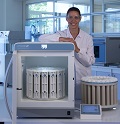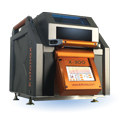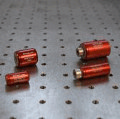|
Advertisement
 |
|
|
Spectroscopy Spotlight
The detection, quantitation, and characterization of nanoparticles using inductively coupled plasma–mass spectrometry (ICP-MS), and in particular using single-particle ICP-MS (SP-ICP-MS), has developed significantly in recent years. However, the difficulties involved in this type of analysis vary, depending on the composition of the nanoparticles. Martín Resano of the University of Zaragoza, together with colleagues from Ghent University, has recently developed a method for characterizing nanoparticles made from silicon dioxide (Si02), which are much more challenging to detect than those made from silver or gold. He recently spoke to us about this work. read more
advertisement
All the capability, none of the limits
Thermo Scientific™ trace elemental analysis instruments deliver quality, reproducible data from any sample type. With a streamlined and intuitive interface, our innovative solutions make it easy for operators at any experience level to analyze samples to meet even the strictest regulations and legislation. So you can have total confidence in your results.
 Expand your potential at thermofisher.com/TEA Expand your potential at thermofisher.com/TEA
|
|
|
Subscribe
Subscribers can enjoy each full issue of Spectroscopy in print, or via Spectroscopy apps.
subscription offers |
 |
|
|
|
Featured Articles
Currently, inductively coupled plasma spectrometry is the most commonly used technique to measure metals within the pharmaceutical industry, and is the recommended technique utilized in the recently updated United States Pharmacopeia chapter on elemental impurity procedures. However, ICP has several drawbacks. Wavelength-dispersive X-ray fluorescence is an alternative technique for elemental analysis used across numerous industries, yet limited literature exists for pharmaceutical applications. read more
advertisement
SETAC North America 39th Annual Meeting
4–8 November 2018
Sacramento Convention Center, Sacramento, California, USA
Join us for the SETAC North America 39th Annual Meeting from 4–8 November in Sacramento, California, for five days of cutting-edge scientific presentations and learning and networking opportunities. The central theme is "Bridging Divides Between Environmental Stewardship and Economic Development." Attendees can expect sessions and course offerings on the latest emerging research, regulatory developments and methodologies in environmental toxicology and chemistry.  Learn More Learn More
Conventional approaches for the assessment of soil mineralogy are primarily based on X-ray diffraction measurements. With this approach the first stage of data analysis involves identification of the minerals present as indicated by the XRD patterns, and a subsequent stage then typically seeks to quantify the relative abundance of the different minerals identified in the soil.
read more
|
|
|
|
The development of new materials and the assessment of nanomaterials requires the correlation of the materials' functionality or toxicity with their chemical and physical properties. To probe these properties reliably, analytical methods that are both sensitive and traceable at the nano- and microscales are required. read more
advertisement
Discover How Triple Quadrupole ICP-MS Will Help You Do More and Simplify Your Laboratory Routines
Thursday, Sept. 27, 2018 at 11am EDT | 8am PDT | 4pm BST | 5pm CEST
 Register now Register now
For analyzing unknown biological stains in a forensic setting, Fourier transform infrared spectroscopy has many advantages. It can provide confirmatory identification of the fluid type, can estimate the stain's age, discriminate species, and can be used on samples found on various substrates and exposed to various environmental conditions.
read more
Shortwave infrared hyperspectral imaging (SWIR HSI) shows great potential in the targeting and identification of explosive and narcotic materials in complex scenes where the target concentration is low. Tunable filter–based SWIR HSI sensors can be configured to use either single-bandpass or multiple-bandpass wavelength tuning to enable hazardous material detection in stationary, moving sensor, or moving target scenarios.
read more
|
|
|
APPLICATION NOTE
|
This study demonstrates the extraction and analytical method for the measurement of selenium, used in animal feed. Total concentrations of several elements were determined according to AAFCO and FDA guidelines.  Learn more Learn more |
|
|
|
|
FEATURED PRODUCTS
 |
Shimadzu's EDXRF spectrometers provide excellent sensitivity, resolution, and throughput for an array of applications, from general screening analysis to advanced materials research. Easy-to-use software simplifies operation for all users.
 Learn more Learn more |
 |
The Milestone Ethos UP is a flexible and high performing platform used for trace metals analysis in environmental labs. This technical note demonstrates digestion of sediment samples with high pressure and high throughput rotors using official EPA methods.
 Learn more Learn more |
 |
MOXTEK inorganic polarizers are designed for broadband UV-VIS-IR wavelengths, have uniform performance over wide cone angles, and can be exposed to temperatures up to 300°C.
 Learn more Learn more |
 |
Inorganic Ventures' heat-sealed, aluminized bag protects our products through the vulnerable timeframe of shipping and storage, providing peace-of-mind that the standards you receive will always be the most accurate.  Learn more Learn more |
 |
The Katanax X-300 is capable of producing fused beads for XRF or solutions for ICP analysis.
Benefits of electric versus gas: Safe, superior temperature control, low power consumption, simple to install.  Learn More Learn More |
 |
EOT will be releasing its Tornos Series Compact 520-810 nm Optical Isolators which eliminate frequency instability, parasitic oscillations, and protect your laser system from optical feedback. These devices feature increased performance and an industry-leading compact design making it suitable for OEM integration.
 Learn more Learn more |
|
|
|
|
|